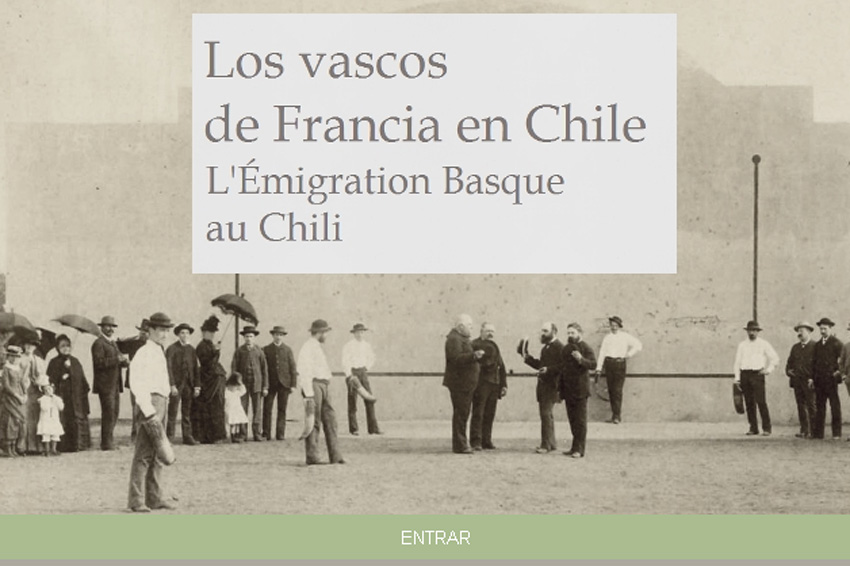Santiago, Chile. Patricio Legarraga is an engineer by profession but a genealogist by passion, as well as the author on several books on Basque emigration to Chile. “I became interested in genealogy when I was at the university, when they asked about my ancestors and since we didn’t talk about it at home, I started to research. My grandfather, Jean Baptiste, was born in Boucau (Bokale, Lapurdi) in 1904, the grandson of Isidoro de Legarraga who was born in Elizondo, Baztan (Navarre). My grandfather came to Chile in 1908 with ten other family members. They came to Valdivia to run a hotel,” he says.
-You have published several books on Basques in Chile, and now a website. What can visitors find there?
I have written books and articles in specialized magazines that were published in Chile as well as in Navarre and in Iparralde. Along with Agustin Otondo, we wrote Emigration to Chile from the Baztan Valley (Navarre) in the 20th Century. I have also published the genealogies of the last two Chilean Presidents, of Ms. Michelle Bachelet and of Mr. Sebastian Piñera. The site www.emigrationchili.com aims to establish a space for information where descendants, family and other interested parties can find family history. It also allows for communication with family members in order to complete research for another edition of my book The Basques in France and Chili with new stories, photos and documents.
Some descendants are missing “the link” that allows them to complete their family chain and know their origins better.
-What aspects would you highlight in the Basque-French emigration to Chile?
It wasn’t very large if compared to that of Rio de La Plata, but qualitatively it was very important for the development of Chile. It is about immigration mainly from Lapurdi.
It was selective immigration that articulated in terms of migratory chains of families and neighbors. In the 19th century they were businessmen with the French Clubs (practically in all cities in Santiago and to the South of Chile there is a French Club). They had well-known hotels like the “Hotel of France.” The business then turned to agriculture, being pioneers in cultivated and raising livestock in the Araucania. They were also pioneers in the forest industry. They were the precursors in the tanning industry and shoe factories. More recently descendants are mainly professionals, having prestigious lawyers, architects, engineers, doctors, and businessmen. We also find priests and soldiers.
The returning “Amerikanuak,” later made their fortune in America building huge mansions in their hometowns, bringing great dynamism to the people with the entrepreneurial spirit that is characterized in Chile. This feeling was especially present in Ustaritz where they build the houses “Lota,” “Talcahuano,” and “Valparaiso,” after cities in Chile where they lived. Every year, a group of Chileans gather in Iparralde, Euskadi or Navarre to celebrate the national holiday on September 18. It is an extraordinary initiative to highlight.
-What dates of entry are included in your records?
The Basque-French emigration to Chile really began in the 1840s after the Independence of Chile in 1818. I was able to census 2,000 immigrants, 62% of which come from Lapurdi; 17% from Behe Nafarroa, and 5% from Xiberua, with the rest being unknown. In regards to the dates, 62% arrived between the years, 1881-1920. Eighty-three percent of the immigrants were men, the majority them being single minors
-Have you had a lot of inquiries from the Basque Country?
Many inquiries come from Iparralde from people who have some family member that came to Chile. There is a real interest in finding out what happened to these family members. In France, many personal archives and documents are kept, along with letters and photographs which is explained by the permanence of families in their family homes.
-On what sources have you based your research?
The first resources that I used were annals of the French Colony in Chile in the 1920s, and census of the French in Chile in 1893, and 1904. These were amplified when I consulted civil and parish records, traveling through cemeteries and interviewing many people. This was complemented with the archives of the Councils of Nante and Santiago. With resources available on the internet they grew and I found online archives very useful such as the “Departmental Archives,” and the “Military Recruitment,” in Chile the Real Estate and Civil Registries are very useful.
-Are you in touch with the Basque-Chilean community? Are you a member of any clubs?
I am a member of the Santiago Basque club and also the Centro Navarro in Chile. I am a member of the Association of Professionals of Basque Origin. I am also in touch with institutions in Iparralde like the l Argentina, the AMME, and the CGPA with whom I am in constant contact and collaborate greatly with.






 Send to a friend
Send to a friend Add comment
Add comment








